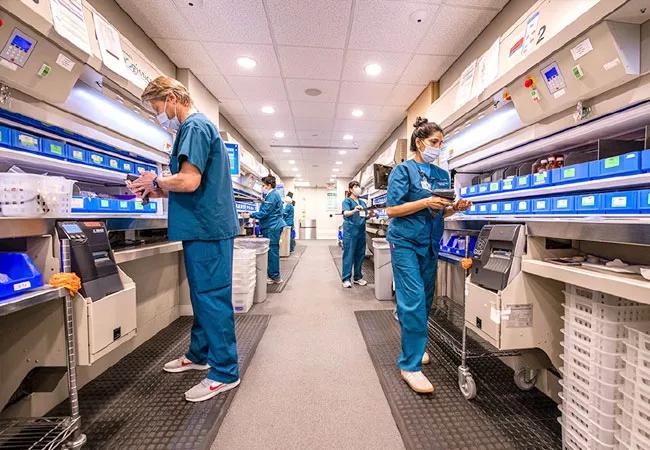Cleveland Clinic programs lead to credentials and careers

Image content: This image is available to view online.
View image online (https://assets.clevelandclinic.org/transform/63e27ad4-cc82-4f34-893d-02cdf44717e1/22-CGO-2837908-Apprenticeships-Experiential-Opportunities_650x450_jpg)
Apprenticeships and internships
Apprenticeship programs are highly successful, with 92% of apprentices retaining employment after completion of their programs, according to the U.S. Department of Labor. Yet when most people think about the training model, they envision traditional trades such as welding, ironworking and plumbing. Cleveland Clinic’s Caregiver Apprenticeship Program, launched in 2021, highlights the breadth of opportunities available.
Advertisement
Cleveland Clinic is a non-profit academic medical center. Advertising on our site helps support our mission. We do not endorse non-Cleveland Clinic products or services. Policy
“Our apprenticeships are learn-and-earn programs that combine meaningful on-the-job experience with aligned classroom learning,” says Gina Cronin, Chief Talent Officer at Cleveland Clinic. “They are an accelerant to build new and broader pipelines of talent.”
The healthcare system rolled out a pharmacy apprenticeship program in October 2021; the Information Technology Department followed suit in January 2022. The Finance Department and Buildings & Properties Department will offer apprenticeships later this year.
Caregivers enroll in 12-month apprenticeships in cohorts of four to 10 people. They are paid as full-time employees, working in the field with the support of a manager, and they receive education that leads to a credential or associate degree.
While the framework for each program is the same, the details differ by department and role. The pharmacy program includes the following:
Apprentices sit for the Pharmacy Technician Certification Board Exam and, upon passing, are graduates of the Cleveland Clinic School of Pharmacy Technology. They can register as a certified pharmacy technician with the Ohio Board of Pharmacy.
The Pharmacy Apprenticeship Program enrolled two cohorts of nine each in October and November 2021. The program is expected to welcome new apprentices every four to six weeks.
Advertisement
The overarching goal of Cleveland Clinic’s apprenticeship model is to establish a broad workforce pipeline for middle-skill positions by employing, upskilling and promoting 500 workers with strong potential per year.
“We are providing a lot of wraparound support for our apprentices, particularly because we want to hire promising talent who may not have had the social support or formal education to know how to thrive in the workplace,” says Cronin.
The support system for each apprenticeship program at Cleveland Clinic includes an executive sponsor, a preceptor who manages the program, a credentialing lead, a human resources business partner, a representative from talent acquisition, a coach from the Mandel Global Leadership & Learning Institute and department mentors.
Building an apprenticeship program in healthcare may seem daunting. Cronin offers advice:
Advertisement
Cleveland Clinic has plans to build on its early successes and expand the Caregiver Apprenticeship Program.
“Once we get our sea legs under us, then we’ll be ready to take the Caregiver Apprenticeship Program to our regional hospitals in Ohio and Cleveland Clinic Florida,” says Cronin. “We are so excited about the opportunities that apprenticeships present for caregivers to develop skills in jobs that offer family-sustaining wages and grow professionally.”
Advertisement
Advertisement
Making a difference by putting empathy into action
A look at how personal stories sparked an enterprise-wide cultural reset
Interdisciplinary program fosters high-performance teams
1:1 guidance benefits individuals and organization
Strategies for building connections, staying present
Annual event galvanizes leaders and inspires excellence
Expert tips from Cleveland Clinic’s Chief Legal Officer
Groups move the metrics in environmental services and sterile processing